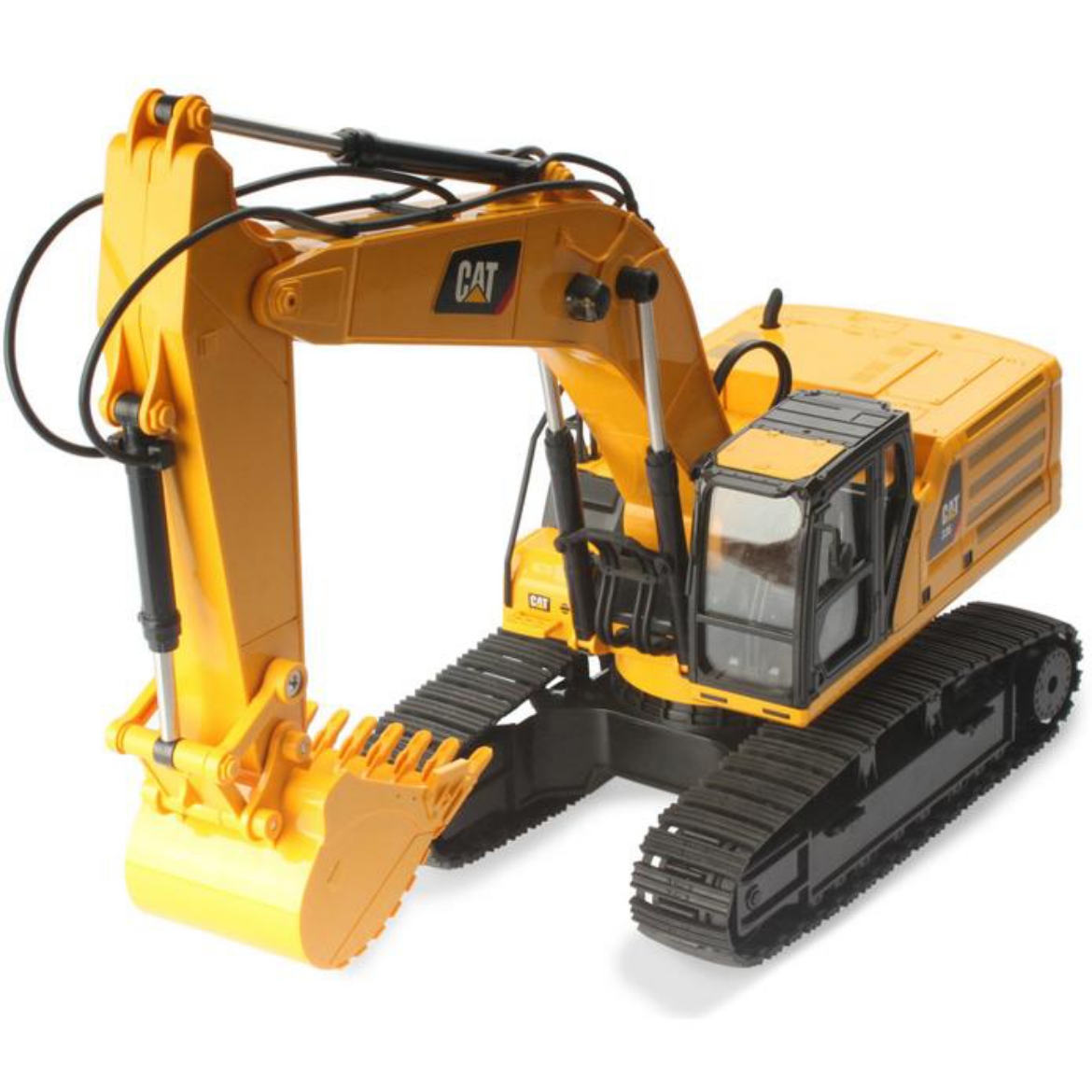What Makes the rc excavator Stand Out Among Other Construction Machines
Wiki Article
Comprehending How Excavator Functions and Its Effect on Performance
Excavators play a crucial role in building and mining procedures, relying upon a complicated interaction of hydraulic and mechanical systems. Their ability to perform a variety of tasks hinges on both their design and the modern technology integrated within. Comprehending these components can considerably impact operational effectiveness and performance. As advancements proceed to reshape the market, one have to think about exactly how these modifications will affect future techniques and efficiency.The Essentials of Excavator Mechanics

The Function of Hydraulic Equipments in Excavators
At the heart of excavator operation exists the hydraulic system, which plays a crucial duty in powering the machine's functions and movements. This system uses pressurized hydraulic fluid to transfer power, making it possible for different activities such as lifting, swinging, and digging. By taking advantage of the concepts of hydraulics, excavators can carry out jobs with remarkable precision and pressure, enhancing total operational efficiency.The hydraulic system contains crucial parts, consisting of pumps, cylinders, and valves, which collaborate to control the circulation and direction of the fluid. When the driver engages the controls, the hydraulic liquid is directed to details cyndrical tubes, converting the operator's commands right into physical movement. This mechanism enables responsive and smooth activities, which are essential in construction and excavation environments. double e volvo rc excavator. The effectiveness of the hydraulic system straight impacts the efficiency and convenience of the excavator, making it an important aspect in contemporary excavation proceduresKey Elements of an Excavator
Comprehending the essential components of an excavator is necessary for understanding just how this effective device runs. An excavator includes several substantial elements, consisting of the undercarriage, home, arm, bucket, and boom. The undercarriage gives stability and mobility, typically including tracks or wheels to navigate numerous terrains. The house consists of the engine and hydraulic systems, enabling the operator to regulate movement and power the device. The boom prolongs from your home, allowing upright reach, while the arm links to the bucket, assisting in excavating and lifting operations.Additionally, the cab houses the driver, geared up with controls for precise maneuvering. Each of these elements plays a vital function in the excavator's overall functionality, adding to its effectiveness and efficiency on construction sites. Comprehending these components assists in keeping and optimizing excavator efficiency, guaranteeing tasks are finished safely and successfully.Add-on Convenience and Its Advantages
Attachment flexibility is a crucial facet of excavators, making it possible for drivers to switch between numerous devices tailored for particular tasks. This adaptability not just boosts task performance but additionally adds to cost-effectiveness by reducing the requirement for several equipments. Recognizing the different kinds of add-ons offered can substantially affect the overall efficiency and functionality of an excavator on task websites.Types of Accessories
While excavators are primarily recognized for their excavating abilities, their real adaptability hinges on the wide array of accessories available. These attachments improve the excavator's capability, enabling it to carry out various tasks past excavation. Common accessories include pails (for digging and scooping), hydraulic thumbs (for comprehending products), and augers (for drilling holes) Grapples are used for managing and relocating debris, while rippers can separate hard surface areas. Various other specialized attachments, such as plates and rakes, enable excavators to adjust to certain work needs. This variety not only enhances the machine's energy across various industries, consisting of demolition, landscape design, and construction, however also enables operators to tailor their devices to meet specific task needs successfully.Increased Task Effectiveness
Maximizing work effectiveness is a primary advantage of utilizing numerous excavator attachments. Different accessories enable an excavator to do numerous jobs without requiring to switch over devices, saving valuable time and labor. For example, using a hydraulic hammer can break concrete while a pail accessory can dig deep into dirt, enabling a seamless workflow. This convenience reduces downtime connected with equipment modifications and enhances productivity on-site. Furthermore, specialized add-ons improve precision in tasks such as grading or landscape design, causing better end results. The ability to adjust to various job demands not only simplifies procedures yet additionally decreases the need for extra equipment, making certain that tasks are completed quickly and efficiently. On the whole, add-on convenience significantly adds to boosted job effectiveness in excavation work.Cost-Effectiveness and Adaptability
Cost-effectiveness is a considerable benefit of utilizing flexible excavator add-ons. These attachments allow a solitary excavator to execute numerous jobs, lowering the need for extra equipment and labor - double e volvo rc excavator. By changing between pails, hammers, and grapples, operators can take on different tasks, from excavating to demolition, thus maximizing equipment utilization. This flexibility not only reduces functional expenses yet additionally decreases downtime connected with transforming equipment. Furthermore, the ability to customize excavators with specialized add-ons enhances productivity, as they can efficiently deal with diverse jobs according to task needs. In conclusion, the combination of cost-effectiveness and flexibility in excavator accessories adds to enhanced operational performance and resource allowance in building and excavation jobs
Advanced Technology in Modern Excavators
Modern excavators are increasingly geared up with innovative technology that transforms excavation procedures. Automation improves operations, while improved fuel efficiency lowers functional prices. Additionally, wise control systems enhance precision and security, marking a significant evolution in excavation tools.Automation in Excavation Processes
As excavation technology progresses, automation has actually arised as a critical component in enhancing effectiveness and precision on work sites. Modern excavators are furnished with sophisticated automated systems that help with tasks such as grading, excavating, and trenching with marginal operator treatment. These systems use sensing units, GPS, and artificial intelligence formulas to ensure exact placing and deepness control, substantially minimizing the margin for error. Additionally, automation enables drivers to concentrate on critical decision-making as opposed to hand-operated controls, causing enhanced efficiency in general. Such innovations not just streamline process but likewise improve safety and security by reducing human error in complex procedures. Subsequently, the assimilation of automation in excavation processes represents a considerable innovation in building and construction innovation, driving the sector in the direction of better effectiveness and efficiency.Boosted Gas Effectiveness
Improvements in technology have actually also led to significant improvements in gas efficiency for contemporary excavators. Modern makers are furnished with sophisticated engines that optimize power outcome while decreasing gas intake. These engines use ingenious burning modern technologies, such as turbocharging and straight fuel shot, to boost efficiency and performance. Additionally, light-weight materials in construction minimize overall weight, enabling much less energy expense during procedure. The intro of variable speed controls allows operators to change engine performance according to specific jobs, additionally decreasing fuel usage. Consequently, these enhancements not only reduced operational expenses yet likewise add to ecological sustainability by decreasing discharges. Generally, improved fuel effectiveness in excavators is a vital development that reinforces productivity and economic stability in the construction market.Smart Control Solution
While drivers browse progressively intricate work websites, smart control systems in excavators have actually emerged as necessary tools for boosting effectiveness and precision. These advanced technologies make use of formulas and sensors to keep track of numerous criteria such as load weight, terrain conditions, and operational efficiency. By instantly adjusting hydraulic functions, smart systems enhance machine efficiency, bring about improved performance and minimized endure elements. In addition, operators profit from intuitive user interfaces that give real-time comments and diagnostics, permitting for informed decision-making. This integration of modern technology not just enhances procedures however additionally minimizes human error, contributing to more secure work settings. As the construction sector remains to progress, wise control systems will play a crucial duty in shaping the future of excavator efficiency and efficiency.Enhancing Operational Effectiveness With Excavators
Excavators play an important function in improving functional effectiveness throughout numerous construction and excavation jobs. Their adaptability permits numerous tasks, including lifting, material, and digging handling, which simplifies process and minimizes remote control excavator the need for added devices. With effective hydraulic systems, excavators can do heavy-duty jobs with precision, considerably decreasing the time called for to full tasks. The assimilation of innovative modern technology, such as GPS and automated controls, even more optimizes their operation, allowing drivers to achieve higher accuracy and reduce material waste. Additionally, modern-day excavators are created to take in much less fuel and lessen emissions, adding to both cost savings and ecological sustainability. By making use of excavators properly, building teams can enhance productivity, fulfill task target dates, and improve overall site management. This multifunctionality and performance make excavators indispensable devices in the contemporary building and construction landscape.The Future of Excavators in Building And Construction and Mining Industries
As the construction and mining industries develop, the future of excavators is positioned for significant improvement driven by technical development and changing functional needs. Advances in automation and expert system are improving excavator capabilities, allowing for boosted precision and effectiveness in procedures. Independent excavators are arising, lowering the requirement for human intervention and reducing the risk of accidents.Moreover, the assimilation of telematics and IoT technology makes it possible for real-time surveillance of device efficiency and anticipating maintenance, maximizing uptime. Green styles, consisting of electrical and hybrid designs, are acquiring traction, aligning with sustainability goals within the industry.Additionally, using sophisticated products and lighter designs improves gas efficiency while keeping efficiency standards. As these patterns progress, excavators will certainly play an important duty in meeting the enhancing needs for efficiency and safety and security in construction and mining, ultimately transforming operational landscapes.Frequently Asked Concerns
Just How Do Climate Condition Affect Excavator Performance?

Climate condition substantially influence excavator performance, as rain and mud can hinder grip and security, while extreme temperatures might affect hydraulic systems. Operators must adjust to these variables to assure ideal performance and safety and security throughout procedures.
What Precaution Should Operators Adhere To While Making Use Of Excavators?
Security actions for excavator operators include wearing suitable individual protective equipment, carrying out pre-operation assessments, making certain proper communication with ground workers, maintaining a safe range from overhanging threats, and adhering to well established operational protocols to stop crashes.Exactly How Typically Should Excavators Be Maintained for Optimal Efficiency?
Excavators must be preserved frequently to guarantee peak efficiency, usually every 250 operating hours or as specified by the manufacturer. Regular checks enhance integrity, avoid unanticipated malfunctions, and prolong the life-span of the tools.
What Is the Average Life-span of an Excavator?
The typical life-span of an excavator usually varies from 10,000 to 15,000 hours of operation. Aspects affecting durability consist of maintenance practices, operating problems, and the quality of the maker itself, influencing overall efficiency and effectiveness.
Can Excavators Operate on Irregular Terrain Properly?
Excavators can operate properly on irregular surface because of their verbalized styles and flexible tracks. These attributes allow them to preserve security and grip, enabling efficient procedure in challenging settings commonly come across in construction and landscaping tasks. Each of these elements plays a vital role in the excavator's overall functionality, contributing to its effectiveness and efficiency on building and construction websites. Making best use of work effectiveness is a primary advantage of utilizing different excavator accessories. While operators browse progressively complex work websites, wise control systems in excavators have emerged as important tools for enhancing effectiveness and precision. Excavators play a crucial function in improving functional effectiveness across different construction and excavation projects. Breakthroughs in automation and synthetic intelligence are reshaping excavator abilities, enabling for improved precision and efficiency in operations.Report this wiki page